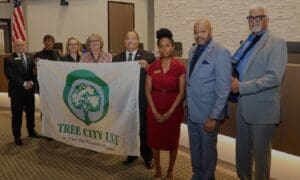F’ville businessman accuses police of blocking access to his workplace
If you’re a police officer making a traffic stop, you follow the offending vehicle off the road and begin processing the ticket when the driver stops.
But what if the police cruiser and the stopped vehicle are blocking commercial activity? Should the officer move the ticketing transaction to another location to allow access to the blocked business?
That was the situation that recently generated a complaint by a Fayetteville business owner over what he said was an excessively lengthy traffic stop on his property.
Fayetteville Police Department Chief Scott Pitts responded, saying the incident could have been handled by officers with more tact and noting that the new officer received training on how to handle similar situations.
The Dec. 9 complaint was filed by Richard Hoffman, longtime owner of Hoffman Tires on North Glynn Street, and a Fayetteville resident.
Hoffman in the complaint said, “On Dec. 3 the (officer) made a traffic stop that ended on my property. I was just leaving to go to a dentist appointment. The time was 12:50 p.m. and on my return at 1:25 p.m. the car and officer were in the same spot. My employees asked the officer to move with no avail. Upon my return I also asked the officer to move. He did not. I feel blocking private property for 35-plus minutes (is) extreme. Also, the officer and his supervisor were rude.”
A photo supplied by Hoffman shows the vehicle that was pulled over parked in a space in front of the tire store and near the adjacent convenience store. The patrol car is parked behind the vehicle, partially blocking the south side of the gas pumps.
Noting the amount of time at the traffic stop, Pitts said a review of the officer’s in-car video showed that the traffic stop had additional variables that required more time to resolve.
“This traffic stop had extenuating circumstances where young children were unrestrained in the vehicle,” Pitts said. “The officer requested the driver to contact a family member to come to the scene and pick up the children with proper safety seats so they could travel home. This caused the stop to be extended for a longer time than usual.”
Pitts said the officer blocked access to the gasoline pumps on one side but did not block access to the roadway.
A second officer arrived and was asked by a Hoffman Tire employee if the cars could be moved. The second officer moved his vehicle to allow for more room for vehicles to travel between the tire store and adjacent gas station, Pitts said.
Pitts said upon his arrival, Hoffman said he wanted to speak to a supervisor. Capt. Patty Kent subsequently arrived at the scene. In her report, Kent noted that Hoffman stated that the officer pulling a car over in his parking lot interrupted his business and that officers needed a warrant to come on his property.
“I advised him we did not need a warrant and that we have no control of where a car would pull in,” Kent said, describing Hoffman’s demeanor as belligerent and provoking. “He continued to interrupt me and make an attempt to again get extremely close to me and Ptl. Arrington pointing his finger. As I was getting into my vehicle to leave I observed Mr. Hoffman point his finger almost in Ptl. Arrington’s face yelling, ‘I pay your salary.’”
Concerning Kent’s perspective of his demeanor, Hoffman on Tuesday said Kent came in with an attitude and the officer at the traffic stop was obnoxious, adding that, “At that point after being told they weren’t going to move, I did raise my voice. I was as polite to them as they were to me.”
Beyond that, Hoffman said that it is not that business owners do not want the police to do their job. Rather, “They could be more considerate. It’s a two-way street. The cops do a good job of keeping the city safe and it’s the business owners that pay the taxes. Several of my customers told me later that they didn’t come in with all the commotion and the blue lights flashing. Every business in town has experienced that sometime. (Customers) avoid those areas.”
Addressing the investigation of the incident, Pitts said the in-car video of the traffic stop showed a second officer who arrived at the scene moving his vehicle at the request of a tire store employee, adding that the entrance and exit to the tire store was still open.
“After reviewing the entire incident I believe we can utilize more tact and understanding when working with our business owners in situations like this to avoid confrontations,” Pitts said. “As the officer is new to our department we have taken steps to coach him on the manner in which he would normally handle this situation and employ a tactful response and in the case of the extended time safely arrange movement of one or both of the vehicles involved.”
Asked about what happens when making a traffic stop where the vehicle pulls onto private property, Pitts said an officer when pulling a vehicle over in a parking lot will park 5-10 feet behind the vehicle and usually at an angle to be able to see the occupants.
“Ninety-nine percent of the time we don’t know who we’re stopping,” Pitts said.
Pitts said, if needed, the officer making the traffic stop will return to the patrol vehicle and use the computer to do the required paperwork. Minus extenuating circumstances, traffic stops often take in the range of 10 minutes to complete, Pitts said.












Leave a Comment
You must be logged in to post a comment.